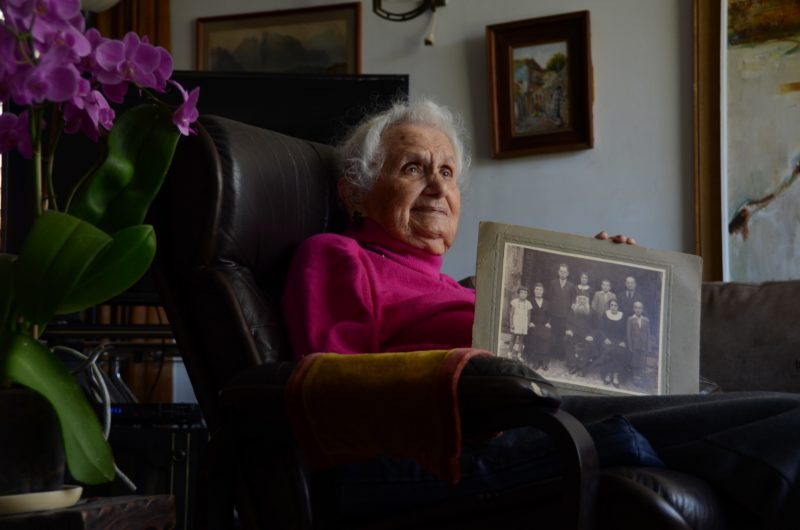
Zippora Singer
Zippora Singer
We were a happy family in 1941, before the war reached us. We knew who Hitler was, but couldn’t imagine the disaster that would befall us because of him. I am the only survivor from my family. I saw Polish friends decline to the worst inhuman conduct, and other people, whose life depended on their last piece of bread, sharing it with others. What the Nazis did to me and to my people will not be forgotten as long as I live, but as an optimistic person I feel obliged to share two lessons I had learned back then: that it is our duty to help peoples and human beings in trouble, and that the human spirit can be found even within the depth of evil. Klaus Himmelstoss is my evidence.
Himmelstoss, a Wehrmacht soldier deployed in our occupied town, took me over to work in his house, which was turned into a clinic. He told me he had joined the Nazi party only in order to make a living, and more than once said that his wife, Friedel, would have never believed what he was doing in the occupied territories. He was the only one who knew I could speak German, and let me listen on soldiers and gain information. Just before he left, he went with me to the commander of the gendarmerie and asked him to save my family when the time came.
When the SS were gathering the town Jews, I noticed the commander and reminded him of the request. He set us free, while other families like us – where the father had already been murdered – were shot to death within minutes. This was the beginning of the ghetto era and we – my mother, sister, two brothers and I – shared a small room with another family. A few months later, Himmelstoss reappeared. He was on his way from Russia to a leave of absence in Germany when he heard a second “action” was about to take place, and decided to stop at Iwie. He found me and gave me a cyanide pill, in case a time came when I’d rather die than stay alive. He said he was ashamed to be a German, and then asked me to memorize his address in Munich and made me swear that I would write to his wife, if I survived. It took me fifteen years to do so. She soon replied that my letter “was the most pleasing thing we got this year” and attached a drawing of my childhood town, which is hung in my house to this day.
Although this story does not represent our horrible tragedy, a short while later I got another chance. After parting with Himmelstoss, all the Jews in town were deported and sent to do forced labor. The chief engineer of the company we worked for turned me into his wife’s maid. I soon found out the wife’s friend had been my nanny when I was a child. This discovery had changed the engineer’s attitude towards me, which played a significant role in the most difficult day of my life. We were sent to a “new job” in a cattle train and got off at Sobibor. My mom, Rivka, and my young sister, Rachel, were sent ahead while I awaited my destiny on the platform. At that stage, the engineer noticed me and said, “They got my Jews suffocated in gas, like rats”. I realized my mother and sister were dead and, still shocked, tried to think how escape this fate with my brothers.
The engineer accepted my request to board his fancy train car with my brothers. It was right in front of the cars that carried Jews to Majdanek. I went looking for my brothers, but two young girls latched onto me and wouldn’t let go. We lost precious time, everyone was back on the train, and that same day I lost both my brothers, Elimelech and Haim Leib, too. Later, some SS men noticed me and the girls in the car. The engineer stopped the train, ordered us out and shot three bullets to make them believe he had killed us – but those shots were aimed at the sky, and I got another chance to survive.
I reported to a nearby gendarmerie and sent to a labor camp. Then I was transferred to Czestochowa, where I told the head of the Judenrat about the gas chambers. When my granddaughter got married, I found out the groom’s grandfather had escaped the ghetto right after my arrival, thanks to this information.
When the allied cannons drew nearer, I was sent to Bergen Belsen. I remember a German soldier turning me over with his boot – I was that weak – and telling me, “your day has come, shwartze”. I tightened up my fists and thought, you’re wrong, I’ll live. I couldn’t believe evil shall rule the world. And at that terrible place, I met Haim Shinesinger, a Polish Jew assigned to the British Army. Lonely and penniless, we got married on my 23rd birthday. Then we moved to Scotland, where our beloved daughter Liora was born, and in 1961 we came to Israel. Despite the dreadful experiences I went through and the loss I feel every day for almost eighty years now, despite the sight and smell of death, I look happily at my three grandchildren and five great-grandchildren.
This is my victory.”
